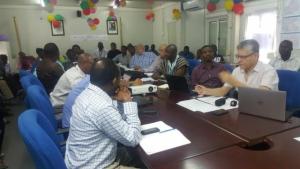WHO welcomes and orientates 16 members of the Stop Transmission of Polio (STOP) 49 to South Sudan
09 February 2017, Juba, South Sudan – In South Sudan, polio eradication continues to be a national priority with renewed commitment at all levels to sustain the interruption of the wild polio virus within the country.
To boost the South Sudanese Polio Eradication Program and help maintain the polio free virus in the country, the WHO country office received 16 STOP team members with the primary aim to strengthen acute flaccid paralysis (AFP) surveillance, support national immunization days, and conduct polio case investigation and follow-up as well as strengthening routine immunization, measles mortality reduction, supportive supervision, humanitarian response and the Integrated Disease Surveillance program.
The STOP team members arrived in the country on a five month mission attended a one day in country orientation session on security, administrative and logistic issues, along with feedback on AFP surveillance, routine immunization, data management, monitoring of supplemental immunization as well as other technical issues including the forthcoming measles campaign.
The STOP team currently in the country will also embark on mentoring of the National Stop Transmission of Polio (N-STOP) members, said Dr Abdulmumini Usman, WHO Representative to South Sudan. This is important as the country prepares for Global Polio Eradication Initiative (GPEI) ramp down and it is hoped that the NSTOP will eventually be used to build a new crop of health workers for the country, Dr Usman said. It will be recalled that the program was interrupted due to the conflicts that erupted in July 2016.
At the end of the orientation, the STOP teams committed to cooperate with all partners in the field and ensure they conduct supportive visits in order to improve the system.
While the last outbreak of cVDPV was declared closed in June 2016, it is quite clear that giant strides will be needed especially with the Global Vaccine Action Plan (GVAP) to prevent millions of deaths through more equitable access to vaccines.. The country continues to struggle to reach individual children with polio vaccines with routine immunization (RI).
Despite the fragile security situation and challenging conditions to vaccinate every eligible child, WHO, together with the Ministry of Health and partners, is providing vital support to scale up immunization programmes.
___________________________________________________________
For more information please contact :
Dr Sylvester Maleghemi, +211 956 779 467, maleghemis [at] who.int (maleghemis[at]who[dot]int)
Ms Jemila M. Ebrahim, +211 950 450 007, ebrahimj [at] who.int (ebrahimj[at]who[dot]int)



